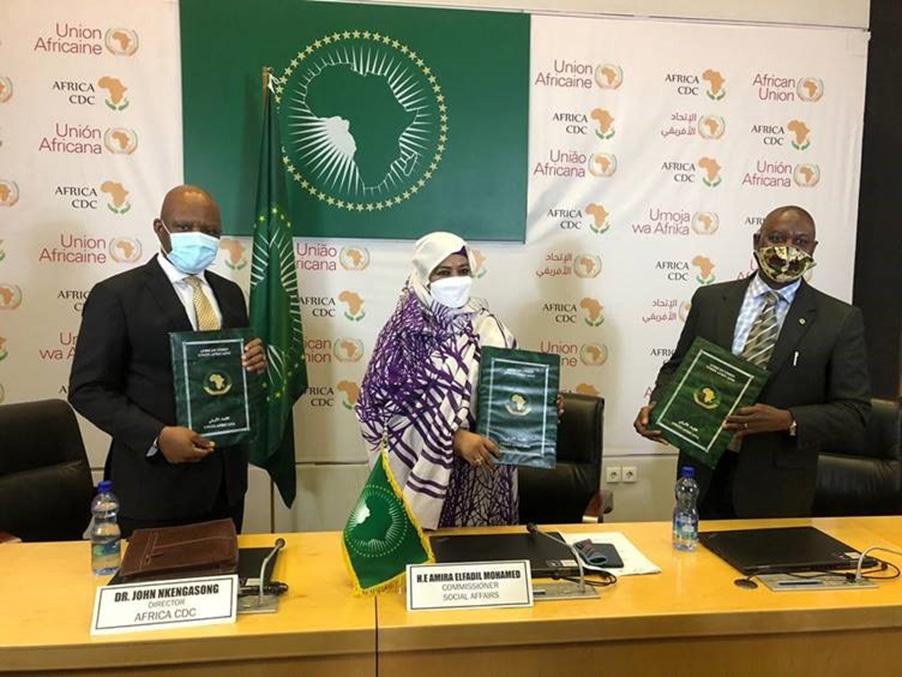
8 minute read
African Development Bank
African Development Bank supports continental strategy on COVID-19 with US$27.33 million
Advertisement
In response to a request by the Bureau of the African Union Heads of State and Government, the African Development Bank (AfDB) has approved a grant of US$27.33 million to the Africa Centres for Disease Control and Prevention (Africa CDC). Awarded under three key components – technical assistance and capacity building (US$19.33 million), institutional support (US$7 million) and contribution to the African Union COVID-19 Response Fund (US$ 1 million) – the grant is to support implementation of the Africa Joint Continental Strategy for COVID19 Outbreak. It will enable Africa CDC to provide technical assistance and capacity building support in combating the COVID19 pandemic and mitigating its impact in 37 African Development Fund eligible African Union Member States. “The fight against COVID-19 is far from being over”, said H.E. Amira Elfadil Mohammed, Commissioner for Social Affairs, African Union Commission. “This generous financial support from the African Development Bank will help strengthen the capacity of Africa CDC to respond to the COVID-19 and future pandemics. It will help improve the capacity of National Public Health Institutes of Member States, support evidence-based epidemic intelligence, strengthen infection prevention and control, and support the Regional Economic Communities”. “The expected outcome from the Bank’s collaboration with the Africa Union is a stronger Africa CDC able to rapidly coordinate emergency assistance across Africa, particularly in low income member countries, beyond the current COVID-19 response, working in collaboration with other development partners, including those in the private sector”, said Dr Abdul Kamara, Ethiopia Country Manager, African Development Bank. In February 2020, Africa CDC developed a continental strategy to respond to the COVID-19 pandemic, aimed to enhance cooperation, collaboration, coordination and communication while preventing severe illness and death and minimizing social disruption and economic consequences due to the pandemic. The strategy was validated by the African ministers of health in February and endorsed by the Bureau of Heads of State and Government in March 2020. Although Africa has not recorded very high number of COVID-19 cases and deaths as in other continents, the impact of the pandemic has been very high on the continent, exerting intense pressure on the already fragile health system and adversely affecting the socioeconomic situation on the continent. Since the validation and endorsement of the continental strategy, Africa CDC has continued to leverage resources to provide technical and material support to Member States in their response to COVID-19. In June 2020, Africa CDC rolled out the Partnership to Accelerate COVID19 Testing (PACT), an initiative that has enabled it to bring partners together as a collective to expand testing, contact tracing and treatment of COVID-19 cases across the continent. “We see PACT as a movement that allows us to do certain things very quickly. Since it was rolled out, testing, contact tracing and treatment have improved across the continent, but we are not there yet. What this tells us is that what we are doing is working and we must intensify our efforts. This is why partnership with institutions like AfDB is very important to us”, said Dr John Nkengasong, Director of Africa CDC.

Emirates partners with FlySafair to strengthen travel options in South Africa
Through the arrangement, Emirates and FlySafair plan to offer the ease of single-ticket travel and through tagging of baggage for travellers transferring from Emirates' three gateways - Johannesburg, Cape Town, and Durban to FlySafair domestic points in South Africa, such as Port Elizabeth, East London and George
Emirates airline and FlySafair recently announced an interline agreement, opening up connections for customers to selected routes on FlySafair's network in South Africa. Through the arrangement, Emirates and FlySafair plan to offer the ease of single-ticket travel and through tagging of baggage for travellers transferring from Emirates' three gateways – Johannesburg, Cape Town, and Durban to FlySafair domestic points in South Africa, such as Port Elizabeth, East London and George. Customers can also take advantage of connecting to FlySafair's points, without backtracking to their initial destination when catching their flight back to Dubai. Customers can book their travel with EK offices and travel agencies. Badr Abbas, Senior Vice President Commercial Operations for Africa said: "We are pleased to begin our interline partnership with FlySafair. Their network complements our South African presence, providing an array of connections for our customers, which makes this a natural partnership. Together, we will open up new travel opportunities, and more choice for customers wishing to travel domestically. We look forward to working together and strengthening our relationship into the future." Kirby Gordon, Chief Marketing Officer at FlySafair said: "Today, we are excited to announce the launch of our interline agreement with Emirates Airline. The superb service and vast route network that Emirates offers is world-renowned, and we are proud to have partnered with them in providing customers greater connectivity when travelling." He added: "We are in a very fortunate position whereby we were able to restart operations in June this year. As of November, we will be operating at our full capacity again, which will see us operating just over 75% of the available domestic seat capacity in South Africa. International traffic is still very limited given the various restrictions in place, but we are happy to report that there has been a slow and steady uptick in the volumes of flights we are selling through our connection agreements like that with Emirates." Emirates resumed its operations into Johannesburg and Cape Town on 1 October, and Durban on 8 October, and is presently operating 17 flights a week into South Africa. Emirates has put in enhanced safety measures in place across all of its onboard and on ground touchpoints. The airline continues to stimulate passenger demand through connecting customers via Dubai from close to 100 destinations, as well as building more connection opportunities in South Africa through partnerships like FlySafair that provide customers more convenience and flexibility.

According to a new report, up to 121 million travel and tourism jobs and US$3.4 trillion GDP could be lost globally without a coordinated approach.
Focus on sustainability, demand evolution and health and hygiene to aid recovery of travel and tourism sector

Aglobally coordinated approach is needed for the travel and tourism sector to recover from the COVID-19 pandemic, according to a new report by global consulting firm Oliver Wyman and The World Travel and Tourism Council (WTTC), which represents the global Travel and Tourism private sector. An estimated 121 million travel and tourism jobs and an US$3.4 trillion in global GDP could be lost as 90% of the global population are adjusting to life under travel restrictions and others stay home in fear of the virus revealed the report titled. According to the report, four macro-trends will lead the way through recovery and beyond.
Demand Evolution
• Preferences towards predictable and trusted destinations • Domestic vacations and the out doors
Health and Hygiene
• Concerns on protocols and crisis situations • Readiness to health protocols
Innovation and Digitization
• Acceleration of digitalization in the travel & tourism sector for a seamless experience • Contactless technologies
Sustainability
• Heightened public awareness and increased importance of wildlife / envronmental impact
Matthieu De Clercq, Partner at Oliver Wyman

• Growing demand for businesses’ support for local community inclusion and diversity The report also highlights that enhancing the current seamless travel experience, embracing the integration of new technologies and enacting global protocols are essential to rebuilding traveler confidence. It showcases the need for the public and private sectors to work together to recover the millions of jobs impacted, rebuild traveller confidence, and build the sector’s resilience. “As full year passenger numbers are forecasted by IATA to reach only 30% of 2019 levels in the Middle East, the implications to the travel and tourism sector brought on by COVID-19 were severe, leaving no traveler, businesses, workforce, and community untouched. As such, it has become essential for public and private sectors to work together to recover the millions of jobs impacted, rebuild traveler confidence, and build the sector’s resilience,” said Matthieu De Clercq, Partner at Oliver Wyman. According to WTTC’s 2020 Economic Impact Report, during 2019, travel and tourism was responsible for one in 10 jobs (330 million in total), making a 10.3% contribution to global GDP and generating one in four of all new jobs. With continual efforts being deployed to rebuild global consumer confidence and encourage the return of safe travels, Oliver Wyman’s second edition of the Traveler Sentiment Survey revealed that nearly 20 percent of global consumers are confident to travel now with interest in leisure travel remaining strong and presenting a growth since May. As the Middle East carefully monitors the opening of its borders to tourists and works through reestablishing travel confidence, there is a growing need for governments and institutions to be proactive in showcasing the highest safety and hygiene standards that are being adopted regionally. De Clercq added: “It is notable that leaders have remained strong and steadfast in the face of adversity with governments in the Middle East having affirmed their commitment to supporting global travel and tourism. This is apparent through the efforts and investments directed towards launching incentives and facilities to support the sector such as streamlining travel and visa processes, improving safety and security, expediting the development and testing of a vaccine and recognizing the sovereign right of states to control the entry of foreign nationals.




